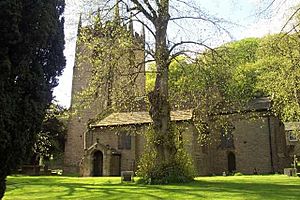St Christopher's Church, Pott Shrigley facts for kids
Quick facts for kids St Christopher's Church, Pott Shrigley |
|
|---|---|

St Christopher's Church, Pott Shrigley, from the southeast
|
|
| Lua error in Module:Location_map at line 420: attempt to index field 'wikibase' (a nil value). | |
| OS grid reference | SJ 945 792 |
| Location | Pott Shrigley, Cheshire |
| Country | England |
| Denomination | Anglican |
| Website | St Christopher, Pott Shrigley |
| History | |
| Status | Parish church |
| Dedication | Saint Christopher |
| Architecture | |
| Functional status | Active |
| Heritage designation | Grade I |
| Designated | 14 April 1967 |
| Architectural type | Church |
| Style | Gothic |
| Specifications | |
| Materials | Sandstone, stone-slate roof |
| Administration | |
| Parish | St Christopher, Pott Shrigley |
| Deanery | Macclesfield |
| Archdeaconry | Macclesfield |
| Diocese | Chester |
| Province | York |
St Christopher's Church is a historic church located in the small village of Pott Shrigley, Cheshire, England. It is a very important building, recognized as a Grade I listed building. This means it has special historical or architectural importance and is protected. The church is an active Anglican parish church, serving the local community.
Contents
History of St Christopher's Church
St Christopher's Church began as a "chapel of ease." This meant it was a smaller church built to make it easier for people to attend services without traveling far to the main parish church. It was likely started in the late 1300s. The church was completed with the addition of the Downes chantry chapel, a special area for prayers. In 1872, the large east window was repaired and updated.
Church Architecture and Design
Outside Features of the Church
The church has a specific layout. It includes a tall tower at the west end, a short main area called the nave, and wide side sections known as aisles. It also has a chancel, which is the part of the church near the altar.
The tower is quite large compared to the rest of the church. It has decorative tops called battlements and pointed decorations called pinnacles. There is also a clock on the tower from 1809. The roofs over the nave and chancel are very old and still in good condition. The nave roof has a special design called a camber beam and a window added later. The roofs of the aisles were covered over a long time ago. The church's style is mostly Perpendicular Gothic, which is a type of medieval architecture.
Inside Features of the Church
Inside, you can see some interesting historical items. Some of the old wooden box pews (enclosed seats) were moved here from another church, St James' Church, Gawsworth. A holy table in the north aisle is from 1695, and the altar rails are also very old.
The baptismal font (where baptisms take place) is made of grey marble and is likely from the late 1700s. Two special chairs in the sanctuary (the sacred area around the altar) are from the late 1600s. Above the chancel arch, you can see the Royal arms of King George III.
Many monuments inside the church honor the Downes and Lowther families. One monument from 1798 was made by a famous sculptor named John Bacon. Another from 1840 was created by A. Gatley. The large east window still has much of its original stained glass, even after being repaired in 1872.
Church Bells
The church has a set of six bells that can be rung together. The two oldest bells are from around 1499. Another bell is from 1607, and one from 1796. The newest bells were made in 1986 by a company called Eijsbouts.
The church also keeps important records. The records of baptisms started in 1629. Records for burials and marriages began in 1685. The accounts kept by the churchwardens (people who help manage the church) started in 1833.
Outside the Church Building
In the churchyard, there is a very old preaching cross. The base of the cross is made of two large square stone blocks, which are probably from the medieval period. The tall, eight-sided shaft and the cross piece at the top were likely added later when the cross was repaired. This cross is also a protected historical item, listed at Grade II, and is a scheduled monument.
See also
- Grade I listed buildings in Cheshire East
- Grade I listed churches in Cheshire
- Listed buildings in Pott Shrigley
 | DeHart Hubbard |
 | Wilma Rudolph |
 | Jesse Owens |
 | Jackie Joyner-Kersee |
 | Major Taylor |

